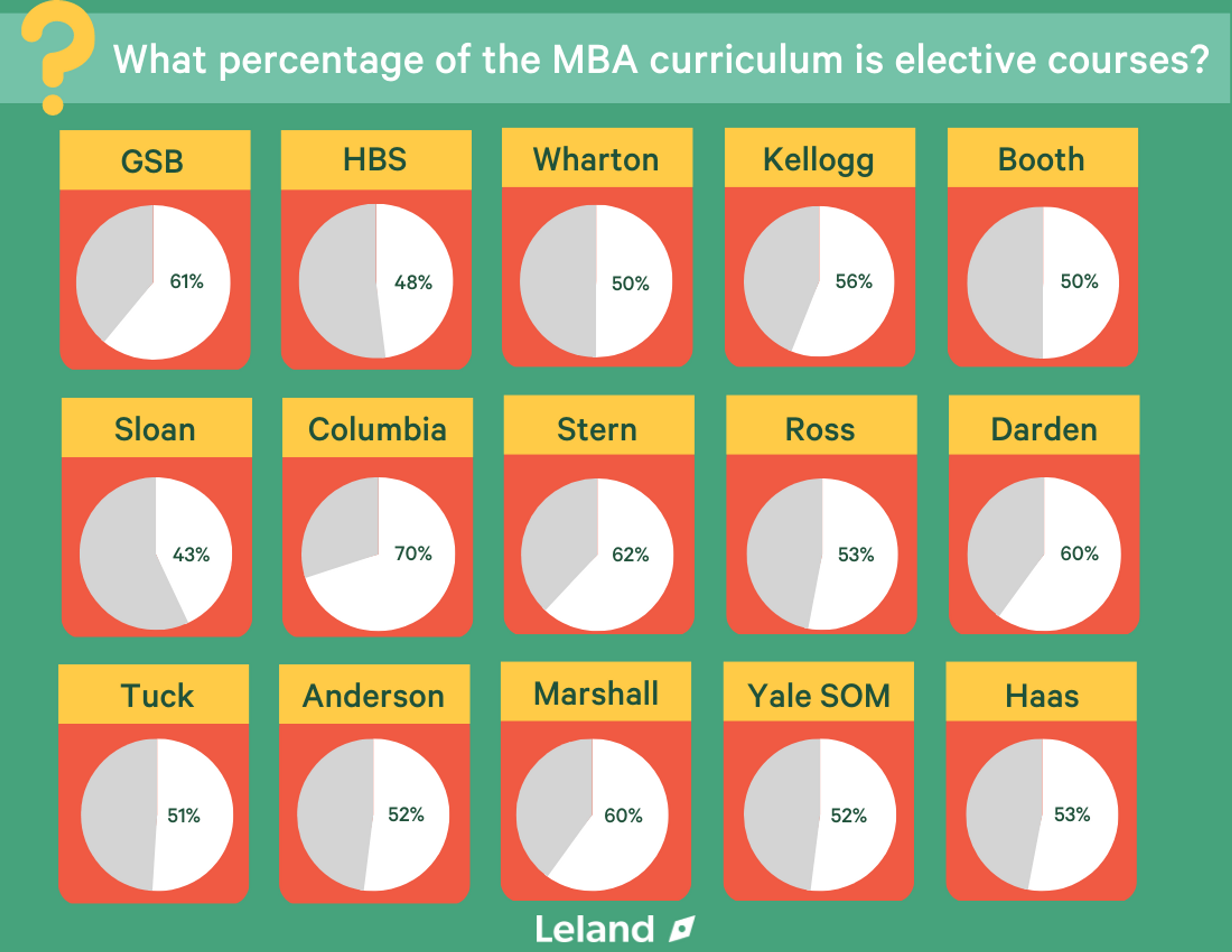How to Choose Electives in Your MBA Program
Master the art of selecting the perfect electives for your MBA program with our expert advice. Align your choices with your career goals, optimize your learning experience, and stand out in a competitive job market.
Posted June 13, 2025

Join a free event
Learn from top coaches and industry experts in live, interactive sessions you can join for free.
Ah, the elusive MBA elective – the cherry on top of your graduate school sundae! While the core curriculum of an MBA program provides a solid foundation in business fundamentals along with leadership and management essentials, elective courses are what allow you to really make your education your own. Whether you're drawn to the excitement of entrepreneurship, the fascinating world of finance, or the magic of marketing, electives give you the opportunity to strategically align your coursework with your post-MBA goals and career objectives.
The elective curriculum at each top MBA program will look different – both the specific courses offered as well as the number and range of electives you’re able to take. For some schools, the majority of the curriculum is electives; for others, core classes take the majority. Here is a rough outline of the percentage of courses that are electives at the top 15 business schools. Read more about what makes each MBA program unique here: Not Every MBA Program is Made Equal–An Overview of the Program Structures of Top Business Schools.

So, grab your course catalog, and let’s dive into choosing MBA electives that will help you maximize your business school experience and set you up for future success. Here are the many different things to consider when deciding on electives.
1. Assess Your Career Goals
Although perhaps a bit daunting, assessing your short and long-term career goals is an important first step to deciding which elective courses are best suited for you. Take some time to reflect on what you enjoy doing, what you're good at, and what motivates you while also paying particular attention to which of these subjects correlate most with your core values. Additionally, ask yourself where you want to be in five or ten years, and consider the skills, experiences, and qualifications you'll need to achieve these goals. Jot down your answers as they will be essential to the next step in our process.
2. Align Electives with Your Career Path
Now that you have a strong sense of your career objectives, it’s time to flip through your course catalog and note electives that are most relevant to your future plans. If you are someone who is interested in marketing management, you might consider building expertise in specific functional areas such as digital marketing or brand management. For example, Stanford GSB offers electives on “Creativity in the Business Ecosystem” and “Customer Acquisition for New Ventures” that you may find relevant.
On the other hand, if you envision yourself as one day being a CEO, courses such as business ethics and corporate finance will help you gain the skills necessary to eventually succeed in a top leadership role. GSB’s “Startup Garage”, “Entrepreneurship from Diverse Perspectives”, and “Product/Market Fit” would all be highly relevant options.
Ultimately, by selecting MBA courses that are relevant to your industry and personal goals, you'll gain valuable knowledge and skills that will make you a more competitive candidate in your career path of choice.
3. Explore Your Interests and Passions
As an MBA student, now is also the time to explore subjects that maybe aren’t directly pertinent to your career aspirations, but are nonetheless topics you are invested in. For the two years you’re enrolled in business school, you have the incredible opportunity to learn from esteemed professors in a wide variety of fields.
There are numerous benefits to pursuing personal interests in electives including increased motivation and sense of purpose, personal growth, and work-life integration. Of course, it is important to sustain a healthy balance between engaging in passion projects and focusing on career-oriented objectives, so make sure that you are carefully weighing all of your options.
3. Discover New Opportunities
The business world is far from a one-dimensional career path! If you are in a situation where you are not 100% sure the direction in which your business administration degree is going to take you, try an elective that is a bit outside of your comfort zone or one that you would normally never consider taking.
This can be a great way to discover alternative career fields or industries you might pursue after graduation. Whether you’re in finance, marketing, entrepreneurship, or anything else, there is a hugely varied selection of fields and industries to choose from. HBS, for example, offers courses on space economics, healthcare strategy, negotiation, and so much more. Who knows, the next connection that lands you a dream opportunity might just be an elective course away!
4. Evaluate the Course Offerings
If you haven’t done so already, at this point we recommend mapping out the courses that you’re interested in. Make a list of your top picks under each bucket: (1) Career, (2) Interests, and (3) Exploratory. Now, we’ll look at the fine print of each, including the content as well as logistics.
Take a close look at each course’s description and syllabus, and make sure they align with what you’re hoping to get out of the class. Also, see who’s teaching it and reach out to classmates who have taken it for their feedback. Then it’s time for logistics: What time is it offered and does it fit into your schedule? Is it complementary to the other classes you’re taking that semester/quarter? Could you take it another semester or does it have to be now? Does it require an application or lottery win?
Considering the timing of MBA electives is critical for a successful academic experience. Planning your elective schedule in advance can help you balance your workload and commitments effectively. It is important to consider factors such as the availability of courses, workload intensity, and personal and professional commitments before officially enrolling. By strategically selecting your electives, you can ensure that you’re not overwhelmed by too many courses at once, and that you have the necessary time and energy to dedicate to each class. This is an important step that will heavily influence the decision on whether or not to ultimately enroll.
5. Seek Advice from Current Students and Alumni
Next, think about talking to former students or alumni to learn about their experiences. Engaging in conversations with these people will not only help you understand the course format and teaching style of certain electives and professors, but also see how specific classes have helped them acquire certain skills and knowledge. Through gathering their insights, you will be able to make more accurate decisions regarding which electives best serve your career plans.
6. Maximize Learning Opportunities
Finally, in order to truly maximize your graduate school experience, it is wise to combine MBA electives with meaningful internships, projects, and/or extracurricular activities. By engaging in interests outside of the classroom, you will be able to apply the valuable skills you’ve learned in your elective courses to real-life scenarios. This will set you apart from other candidates in the job market and ensure that the classes you are taking align with your pursuits.
You’ve reached the end of our guide to how to choose electives in your MBA program! As you navigate your academic journey, we hope these steps will help you to narrow down your interests and maximize your learning opportunities as a soon-to-be MBA graduate! We’ve got many coaches who are alumni of the best business schools in the country and can help you evaluate course offerings and professors. Here are some of our most popular MBA coaches, browse all of them here.
Here are some other articles you may find helpful:






























